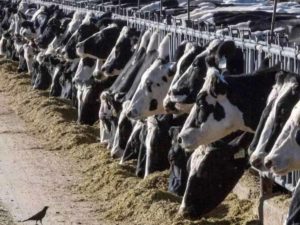On behalf of America’s dairy industry: Thank goodness!
Mexico is the No. 1 market for many American-made and -grown products. Last year, we shipped $1.4 billion of milk, cheese, whey, ice cream and other dairy items to Mexico. But as this year has worn on, ongoing trade disputes with Mexico have begun to take a toll, biting into U.S. exports and squeezing American jobs.
The U.S. Department of Agriculture, which tracks food and agriculture markets around the world, has lowered its expectations for trade between the United States, Mexico and Canada “due to domestic factors and trade uncertainty.”
In March, overall dairy exports to Mexico decreased 6% in value, year over year, while U.S. cheese exports to Mexico declined 17%, despite strong demand in other markets.
Wisconsin’s total food and agriculture exports are heavily dependent on North American trade. Already this year, Wisconsin’s exports have declined 40%, with cheese and whey exports falling by $58 million. In other words, the lack of a trade deal with Mexico and Canada is costing us.
Over the last 25 years, U.S. food and agricultural exports to Canada and Mexico more than quadrupled under the North American Free Trade Agreement (NAFTA), growing from $9 billion in 1993 to nearly $40 billion in 2018. NAFTA not only created a reliable, high-quality supply of food products for North American consumers, it also supported roughly 900,000 American jobs in food and agriculture and related sectors of the economy.
The United States-Mexico-Canada Agreement (USMCA) builds on the success of NAFTA, makes improvements to further enhance U.S. food and agricultural exports, and will ultimately lead to freer markets and fairer trade.
Under USMCA, dairy producers in states such as Wisconsin benefit from a more-level playing field, including preserving duty-free market access to Mexico, eliminating Canada’s unfair milk pricing program, and expanding access to Canada.
Today, roughly 1 in 5 dairy cows produce milk for export. Despite trade uncertainty with other major markets such as China and Japan, U.S. dairy producers achieved record exports in 2018, selling $5.6 billion to customers of products around the world. They sold to people who have come to rely on the United States to offer the highest-quality dairy products.
Though these gains have dropped off in early 2019, sales of American whey, lactose, milk fat, casein and milk powders have surged in recent years, not to mention huge and growing demand for cheese and butter.
That growing demand is great news for Wisconsin, which produces one-quarter of all the cheese made in the United States. Overall, Wisconsin’s dairy industry pumps about $82,500 per minute into the state economy. Imagine if that economic productivity — those jobs, businesses and even the business taxes that support schools and roads — were to disappear?
This is where we find ourselves today — a supplier with doubtful buyers — and that is why passing the USMCA trade deal is so important to our local, state and national economies. The U.S. dairy industry supports more than 3 million jobs in the United States and pumps $620 billion into the U.S. economy. Wisconsin dairy generates 10 percent of the total.
By all accounts, the new North American trade deal negotiated by President Donald Trump’s administration will give U.S. dairy expanded market access to Canada and Mexico. With proximity to Canada, Wisconsin is one of the biggest beneficiaries of the deal.
But so far, Congress has refused to vote on it. The longer Congress waits to vote on the deal, the more uncertainty is created in the dairy market, making it more likely that our foreign customers move on to find other suppliers.
When I speak to members of Congress one-on-one, most tell me that USMCA offers an improvement over the former NAFTA for most sectors of the U.S. economy. That is certainly true for dairy, which stands to gain more than $277 million in expanded sales to Mexico and Canada, according to an analysis by the federal government. Overall, the new trade deal would raise U.S. GDP by $68.2 billion and create about 176,000 new American jobs.
Now that the recent trade dispute with Mexico is behind us, it is essential that Congress look past politics and focus on getting this deal done. The USMCA grows American jobs, expands U.S. export markets, and restores America’s reputation as a reliable supplier of the best dairy products in the world.
Wisconsin’s dairy industry pumps about $82,500 per minute into the state economy. Imagine if that economic productivity — those jobs, businesses and even the business taxes that support schools and roads — were to disappear?
Dykes is president and CEO of the International Dairy Foods Association: www.idfa.org.










